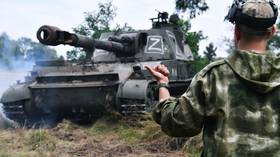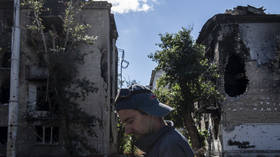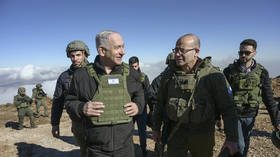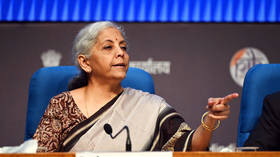Here’s why Russia’s Kharkov offensive is far more than just a military setback for Kiev

In “Chapaev,” a 1930s Soviet film classic still very familiar in both Russian and Ukrainian popular culture, a famous key scene depicts a “psychological attack.” In the movie, this does not refer to propaganda or information warfare, as we might assume now. Instead, the attack is a disciplined advance across a real battlefield, carried out with so much panache that it almost panics the defenders into a rout. In the old Soviet film, this assault is repelled.
Yet, in reality, things can turn out differently: There are signs that Russia’s recent offensive in Ukraine’s north-eastern Kharkov region, while unlikely to have been designed for such effects, may be turning into a psychological defeat for Kiev and its Western backers.
Without insider knowledge, we cannot know the exact aims that Moscow intends to pursue with this operation. We do know what it has achieved, at this point, in terms of territory and positions taken: more than 100 square kilometers, including a growing number of villages. According to Ukrainian officers and media, Russian forces are fighting in the town of Volchansk, a local center of military importance. It is hard to predict where this particular advance will stop. But given the – as of now, at least – comparatively small forces deployed in this operation, it is unlikely that it was meant to capture the city of Kharkov, Ukraine’s second-most-important urban center. It may, however, serve to bring it within the range of Russian artillery again, which could serve future and larger offensives.
More probable guesses regarding Russia’s goals include the creation of a buffer zone to protect the Russian region and city of Belgorod and exert pressure on Ukraine’s military to over-extend its already depleted resources. Russian forces starting fresh attacks in additional regions (Sumy and Chernigov) – opening what one British newspaper has already termed yet another, “third” front –would fit this pattern. And Russian aims need not be static, of course: Moscow can begin operations with one set of aims but revise them when fresh opportunities open up, which may be happening in this case.
What requires less guessing is assessing the impact of the attack on Russia’s two opponents: Ukraine and the West, in particular the United States. Unsurprisingly, both Kiev and Washington are making efforts to put on a brave face. Both – most likely with a degree of coordination – are trying to downplay their losses and future risks. US Secretary of State Antony Blinken has paid a surprise visit to Kiev. Acknowledging that the situation is “challenging,” he has tried to keep hope alive by promising that American aid will arrive soon and make a great difference. The problem is that he cannot know that; and it is inherently unlikely. For two reasons: There is not enough aid, and there cannot be enough aid, given Ukraine’s underlying weaknesses in manpower which cannot be repaired with any amount of Western funding.
Ukrainian President Vladimir Zelensky as well, has sought to reassure domestic and international audiences. Claiming that his military understands Russian plans to stretch the Ukrainian defense thin, he has promised that other important sections of the front, for instance in the Donbass town of Chasov Yar, will not be abandoned. But what if it does not matter if Zelensky sees through Russian strategy or not? His real choice may only be between where Russia will make gains and where Ukraine will lose. That is the essence of being over-extended. Ukraine’s military has already, according to CNN, “hinted clearly at” further retreats on the Donbass front.
More interesting than these rationalizations of a worsening battlefield crisis are reactions that are both more candid and less optimistic. For one thing, the Russian advance is turning into not only a Ukrainian (and Western) defeat, but also a Ukrainian scandal reported in the West in an unusually forthright manner. In Ukraine, the quick and almost unresisted Russian march through what should have been a zone of fortifications, minefields, and traps has led to accusations of corruption on a level that can only be described as treasonous. Ukrainskaya Pravda, a traditional stalwart of pro-Western sentiment and patriotic mobilization rhetoric, is asking where the fortifications are. Pointing out that regional authorities have paid millions to fictitious companies to build what clearly either is not there or is so shoddy that it might as well be missing entirely.
In the West, the BBC – no less – has given global resonance to a Ukrainian special reconnaissance officer, Denys Yaroslavsky, who says that he and his men saw Russian forces “simply walk in.” Something important that should have been there to at least slow them down, was missing: While Ukrainian officials “claimed that defenses were being built at huge cost,” as the BBC reports, the costs (and, for someone, profits) materialized, but the defenses did not. “Either it was an act of negligence, or corruption,” Yaroslavsky has concluded. “It wasn’t a failure. It was a betrayal.”
That Ukraine’s war effort suffers from great corruption would be news only to the most naive. But its open denunciation in and outside Ukraine points – not for the first time, it is true – to the decreasing capacity of the Zelensky regime to shape and control crucial narratives. In a similar vein, the self-contradictory output of Ukraine’s notorious head of Military Intelligence, Kirill Budanov bespeaks, at least, confusion. On one side, Budanov has painted what the New York Times has called a “bleak picture.” In conversation with the American newspaper, he has described Ukraine’s situation as “on the edge.” More specifically – and more importantly – he even went as far as to openly name his country’s worst Achilles heel, its stark lack of reserves to shift around under acute pressure on any given part of the frontline. While also predicting a future “stabilization,” Budanov stressed risks and constraints. Yet speaking to a home audience, via Ukrainian TV, the general shifted his emphasis to “stabilization” only, promising that Russian forces are already contained, at least “in principle.”
Clearly, Russia’s operation in Kharkov Region is an ongoing battle within an ongoing war. It would be rash to predict outcomes, at least in detail. Yet, if we zoom out and focus on major developments, two things are certain: First, Moscow has and retains the initiative. That is why its forces are on the offensive and why it decides about the purpose of their attacks, while Ukraine and the West are now reduced to reacting. Second, despite the laboriously maintained facade of optimism and perseverance, both Ukraine and the West are openly showing signs of nervousness, and more specifically of a nervousness induced by Russian pressure. That, for now, is the most obvious effect of the Kharkov operation, even if it may be hidden in plain sight.
The statements, views and opinions expressed in this column are solely those of the author and do not necessarily represent those of RT.















